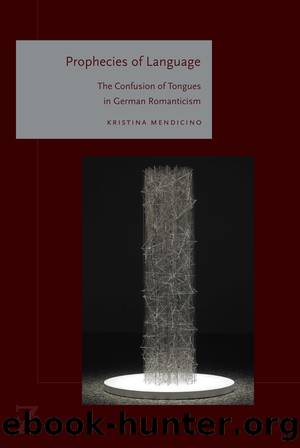Prophecies of Language by Kristina Mendicino

Author:Kristina Mendicino [Mendicino, Kristina]
Language: eng
Format: epub
ISBN: 978-0-8232-7403-1
Published: 2016-07-11T16:00:00+00:00
Empedocles, Empyrically Speaking—: Friedrich Hölderlin’s Tragic Öde
With the break of day, I thought to say to you the word,
the stern and long withheld one . . .
Mit Tagesanbruch dacht’ ich euch das Wort
Das ernste langverhaltene, zu sagen . . .
–Friedrich Hölderlin, The Death of Empedokles
The tragedy that Friedrich Hölderlin intended to devote to Empedocles never came to an end. Suspended between the heavenly fire that had dawned—and broken—upon him and the fire of Aetna into which he longs to plunge; between the word that he had intended to offer the people of his city, and the sign that he wishes, in burning, to become, Empedocles would be the prophetic figure of Hölderlin’s poetic oeuvre, whose enunciation remains irrevocably withheld. His drama—which never takes place—revolves around an incendiary word that he should have delivered as a parting gift to the Agrigentians, then doubled by burning himself. Such are the burning points of the drama, which structure its course without ever being touched—and which would have been destined either to rejuvenate the polis or to pronounce its end, and with it, the beginning of a new era. If Hölderlin may have been inspired to choose his protagonist, whose biography he had read in Diogenes Laertes’s Lives of the Philosophers, by the impression “that what is passing and changing in human thoughts and systems strikes me nearly more tragically than those fates which one usually calls [ . . . ] real,”1 it would be at least as appropriate to speak of the death of the prophet as it would be to speak of “the death of the philosopher,”2 when it comes to Hölderlin’s unfinished drama, The Death of Empedokles.
The suspension of prophetic address in the draft materials and poetological prose texts known as Hölderlin’s Empedokles solicits a critical return to what Paul de Man once called “a persistent tendency to treat Hölderlin as a prophetic and eschatological poet, the precursor of a new historical era that his work helps to prepare” (“The Riddle” 211). With these words, de Man rightly pointed out the limitations of the hagiographic approach to Hölderlin adopted by members of the George school, among others—not least of all in relation to his Empedokles. It does not escape Max Kommerell, for example, that the role he assigns Hölderlin in his own text is tightly bound up with that of Hölderlin’s dramatic figure, Empedocles, whom he calls “Hölderlin’s unique, unrepeatable mysterium” in the final chapter of Spirit and Letter in Poetry, which is devoted to Empedokles (330). Yet whereas Empedocles attempts to speak the wrong word at the wrong time—because he places a wrong emphasis upon his own person—Kommerell announces Hölderlin’s success as the prophet who can mediate between the gods and his people precisely where his protagonist fails. “In a genuine act of imparting,” Kommerell writes, “Empedokles would merely be, so that the God could step through him, out into the people—and to mediate this way was granted him only in death” (328). He would merely be, in other
Download
This site does not store any files on its server. We only index and link to content provided by other sites. Please contact the content providers to delete copyright contents if any and email us, we'll remove relevant links or contents immediately.
| Ancient & Classical | Arthurian Romance |
| Beat Generation | Feminist |
| Gothic & Romantic | LGBT |
| Medieval | Modern |
| Modernism | Postmodernism |
| Renaissance | Shakespeare |
| Surrealism | Victorian |
4 3 2 1: A Novel by Paul Auster(11045)
The handmaid's tale by Margaret Atwood(6850)
Giovanni's Room by James Baldwin(5876)
Big Magic: Creative Living Beyond Fear by Elizabeth Gilbert(4723)
Asking the Right Questions: A Guide to Critical Thinking by M. Neil Browne & Stuart M. Keeley(4573)
On Writing A Memoir of the Craft by Stephen King(4212)
Ego Is the Enemy by Ryan Holiday(3989)
Ken Follett - World without end by Ken Follett(3972)
The Body: A Guide for Occupants by Bill Bryson(3797)
Bluets by Maggie Nelson(3707)
Adulting by Kelly Williams Brown(3667)
Guilty Pleasures by Laurell K Hamilton(3585)
Eat That Frog! by Brian Tracy(3512)
White Noise - A Novel by Don DeLillo(3434)
The Poetry of Pablo Neruda by Pablo Neruda(3364)
Alive: The Story of the Andes Survivors by Piers Paul Read(3309)
The Bookshop by Penelope Fitzgerald(3225)
The Book of Joy by Dalai Lama(3215)
Fingerprints of the Gods by Graham Hancock(3210)
